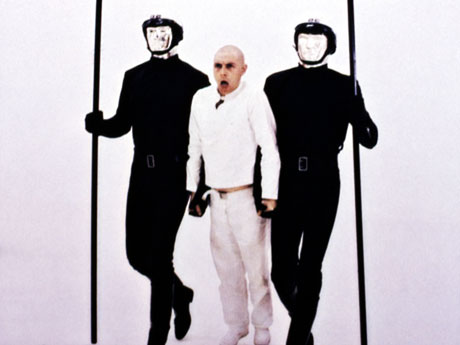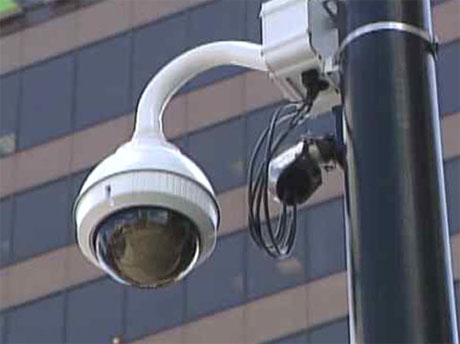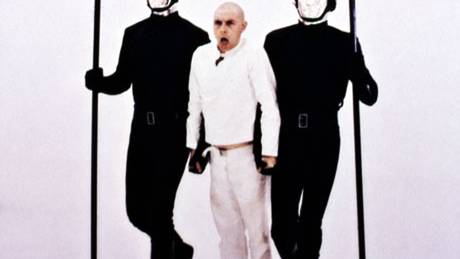Big Brother only wants to help you
Source: timesonline.co.uk

The ‘Town Hall Stasi’ have been pilloried by politicians for tracking our every move but, as Hugo Rifkind discovers, the eyes behind the surveillance cameras can be a force for good — tackling everything from noisy neighbours to dog mess.
I'm under cover with some spies, about to plant a bug. Or rather, to be more precise, I am in a stylish, modern flat in a riverside block in Newcastle, with a man called Ed and a man called Ian, and a young couple who have barely slept in six months.
The target lives in a neighbouring flat. He has a stereo in his living room and a stereo in his bedroom. He goes clubbing twice a week, and usually brings the club home. Every time Manchester United play, he has a party. “I think he's also got a new drum kit,” adds the husband, helplessly. He has never spoken to this neighbour. He was going to once. Another neighbour got there first. It sounded as though there was going to be a fight.
Ed asks for silence, so that he can calibrate the machine. Outside, we can hear cars and seagulls. And then, bang on cue, there is a thump. The wife gives a nervous laugh.
Depending on who you ask, Ed Foster and Ian Cross are “snoopers” (most newspapers), “Town Hall Stasi” (one newspaper), “instruments of a creeping Orwellian state” (Chris Huhne, the Lib Dems' home affairs spokesman) and “eroding our fundamental freedoms” (Dominic Grieve, the Shadow Home Secretary). These are the people that David Davis was so concerned about, the ones whom the Daily Mail and The Daily Telegraph insist are hell-bent on misusing “anti-terrorist legislation” and turning Britain into a bleak facsimile of Cold War East Germany.
Ask Newcastle City Council, however, and it will tell you that Foster (clean-cut, bespectacled) and Cross (greyer, looks like a former policeman; is one) are council employees in the environment section. Its team plants around 60 of these “bugs” each year, in response to about 8,000 complaints about noise.
Only the police or security services can actually bug your house. The local council has to bug the house next door. They're not small, bugs. This one is a large DAT recorder sealed in a plastic suitcase, with a wire that leads to a microphone on a stand. It's not exactly Mission: Impossible. It certainly doesn't feel like a spy mission. It just feels like two helpful chaps in ties, fiddling with a high-tech Walkman. But maybe that's just me.
The fuss about surveillance, or at least the latest round of it, kicked off earlier this year, in Poole. Remember that? It concerned school applications. For a period of weeks, officials had been studying the movements of parents, to establish that they lived where they claimed they did. Cue media fandango. The surveillance was conducted under the Regulation of Investigatory Powers Act 2000 (RIPA), invariably otherwise known as “anti-terror legislation”. Of which more later.
Speaking to a House of Lords committee on Wednesday, Vernon Coaker, the Policing Minister, finally agreed to crack down on local authority surveillance. There have been too many stories, peers felt, about town halls spying on people who put their bins out on the wrong day, or who let their dogs poo where a dog should not. “We have to stop some of these other things happening,” said Coaker, to growls of approval.
Perhaps you're growling yourself. Perhaps even my vignette above, from Newcastle, made you shudder. The Lives of Others. Surveillance society. Stasi Britain. All that. A land where neighbour denounces neighbour, CCTV cameras watch our every move and robots trawl through our dustbins, looking for mouldy aubergine in the recycling section.

A spokesman for the pressure group Liberty called the Poole affair “hugely intrusive”. In time, it emerged that many councils were using RIPA powers, some of them quite frequently. Newspapers began campaigns, Keith Vaz, MP, the chairman of the House of Commons Home Affairs Select Committee, declared himself “personally shocked” and various people began to promise that various things would be done. And, in Newcastle, the council leader, John Shipley, began to grow alarmed.
His officers didn't use covert surveillance in investigations connected to schools, bins or dog poo, but they did use it in plenty of other areas. And yet Councillor Shipley was confident that they weren't doing anything wrong, or even anything that would sound wrong. So, whereas most local authorities prefer to keep quiet about their RIPA use, he decided that Newcastle should come clean. He demanded full details of all surveillance activities, and he made sure that all of his fellow council members knew about them as well. Then, before anybody asked him to, he explained it all to the local press. No other council in Britain thought to do this. If the public tend to be frightened about surveillance, this could give us a clue as to why.
“I have seen nothing that has caused me concern,” shrugs Councillor Shipley, in a wood-panelled boardroom in Newcastle Civic Centre. “And we have had no complaints. Zero. None. Not one.” Shipley and his officers crack a few jokes about my Dictaphone, and then began to school me in the legal technicalities of directed surveillance - “the covert surveillance of a particular person, or for the purposes of a specific investigation, where private information about any individual is likely to be obtained”.
RIPA is a new-ish law, but it did not grant new powers. Councils have always had the power to spy on people. Before conducting surveillance on anybody, a council officer now has to fill out an extensive form. I see a recent one, which is an application to record the noise of a barking dog. It is very, very long. “Installation of a Digital Audio Tape (DAT) recording device into the complainant's address,” it says, at the most exciting bit, “for a period of one week in order to record noise (barking dog).”
Between April 2007 and July 2008, covert directed surveillance, as authorised under the aforementioned RIPA, was used in Newcastle a total of 123 times. Possibly this is fewer than most - Sir Christopher Rose, the Chief Surveillance Commissioner, reckons that, across the country, around 30 authorisations are granted each day. In Newcastle, around half were the result of noise complaints, as above. Of the remainder, most were concerned with either tenancy affairs in council housing or the misuse of parking permits. Both basically involve watching people, to check that they live where they say they do. Other councils watch people putting out bins or walking their dogs in much the same way. If you're watching people, and you are hiding it, then it is covert. That's what covert means.
To see how this works, I visit Newcastle's parking centre, which doubles as the city centre's main CCTV control room, under a multistorey car park and between John Lewis and M&S. The modern CCTV camera is slightly chilling in its efficiency. It can pan from side to side and zoom in to a far higher resolution than you might expect.
Out on the street, once you know what you are looking for, they are everywhere - black, opaque demi-globes. The ones that actually look like cameras tend to be either for traffic management or low-tech security systems owned by shops.
One CCTV headquarters is pretty much like another. I have seen a few. Big Brother may be watching us, but he doesn't seem very interested. Usually you will find a couple of uniformed operatives flicking from camera to camera. Sometimes they call the police, sometimes the police call them. With a journalist in the building, they usually remember not to yawn. Most cameras record, which means that, under an RIPA request, tapes can be pulled. Under the Data Protection Act, every member of the public theoretically has the right to see tapes every time they can be identified on CCTV. Not a lot of people know that.
CCTV is an invaluable resource for surveillance, but cameras are not (yet) on every street corner in the land. Elsewhere, you need actual human beings. I meet Heather Buchan, who heads Newcastle's parking team, and Lawrence Gray, one of her officers. Both seem bemused that their routine investigations could be considered anything other than unremarkable.
As in the bad old days out East, most investigations begin with an anonymous tip-off from a member of the public. For the parking team, these tend to concern the misuse of blue disabled bad-ges, or people obtaining residents' permits for places where they don't actually live.
“Usually, officers will sit in an unmarked car,” says Gray. “With a camcorder.” “Or they'll use the hidden camera,” adds Buchan. “On the back window.” A hidden camera sounds quite exciting. How does it differ from a normal camera? “It's hidden,” Buchan explains. “Normally under a cushion.” CSI this is not. Should the anonymous tip-off prove unfounded, does the watchee ever know that he or she has been watched? Buchan and Gray exchange a glance. The answer is no. But at least 90 per cent of the time, says Gray, the tip-off proves correct.
Most newspapers seem incapable of referring to RIPA without dubbing it an “anti-terror law”, as though its employment by local authorities is inevitably some sort of heavy-handed abuse. On Wednesday, in that House of Lords committee, their lordships did the same. As any council officer, lawyer or unhysterical crime journalist will wearily tell you, this simply isn't the case. In 2000, true enough, it applied only to the police and security services. As Home Secretary in 2003, David Blunkett extended the law to apply to local authorities and other public bodies, to be used for exactly the purposes that are now, suddenly, so controversial.
If Vernon Coaker means it, and local authorities are to have their powers curbed, let nobody pretend that this is not a serious U-turn. Only in July, Jacqui Smith, the Home Secretary, was insisting that “these powers can make a real difference in delivering safer communities and protecting the public, whether enabling us to gain that vital intelligence that will prevent a terrorist attack or working to tackle antisocial behaviour.” Smith, and Blunkett before her, may now feel that their conflation of terrorism and antisocial behaviour was a bit of a mistake, politically speaking. And yet, for many, it's the latter that affects their lives far more. Under RIPA, as people keep telling me, surveillance has to be “proportionate”. It's a very vague term. Dog poo and neighbour noise sound like trivial matters only when it's not your sleep that is being interrupted or your front garden that is squidgy and brown.
So here I am with Foster and Cross as they plant their bug in this rather chic Tyneside flat. The couple here are thrilled. They first called the police half a year ago, only to be told to call the council instead. TV dinners are abandoned steaming on a coffee table as Foster shows them what to do. There is a button on a cable protruding from the bug, like a weather man might have on his slide projector. When the noise starts, they should push it; when it stops, they should push it again. Foster and Cross will be back in a week.
In a certain light, it's hard to deny that this can all look quite sinister. The object of this complaint will already know that he has been complained about, but he won't know who did the complaining. He will have been visited by noise officers, but he won't know who sent them. He will know that he may be recorded, but he won't know which neighbour will be taping him, or when. If the noise ends, he'll never even know if he was recorded or not. If the noise continues, the council may seek a noise abatement order - a sort of auditory ASBO. Farther down the line it may seek a warrant to enter his property and take away his stereos. Maybe his drum kit, too.
You may find all this rather chilling, in a country such as ours. You may wonder if an Englishman's home will ever be his castle again. Me, I just think of that weary couple, not wanting any more trouble, just wanting some sleep. And, you know, I'm not so fussed.
Article from: http://www.timesonline.co.uk/tol/news/uk/crime/article5200949.ece
Orwellian Ubiquitous Computing May Build Ultimate Surveillance Society (Video)























